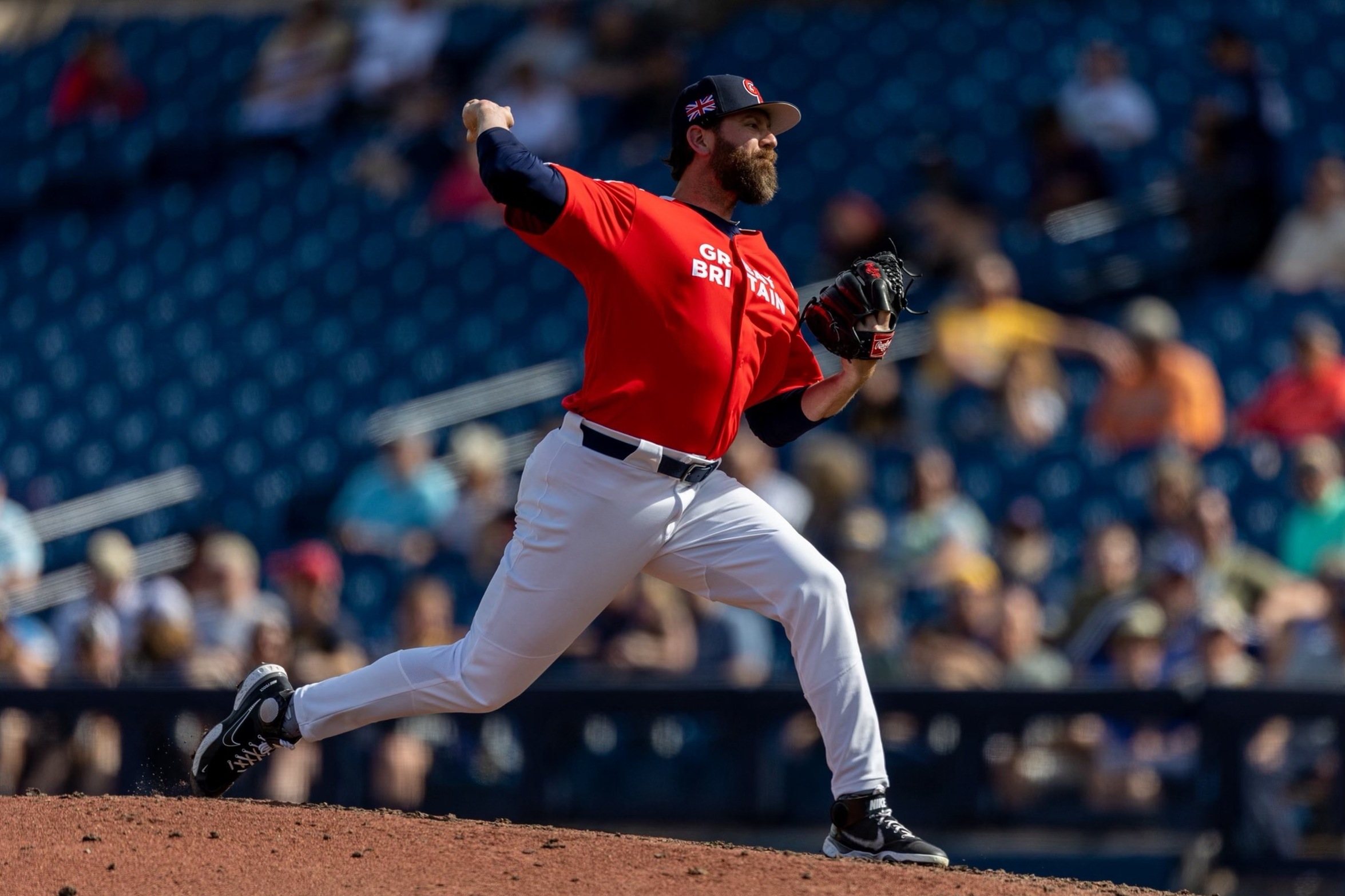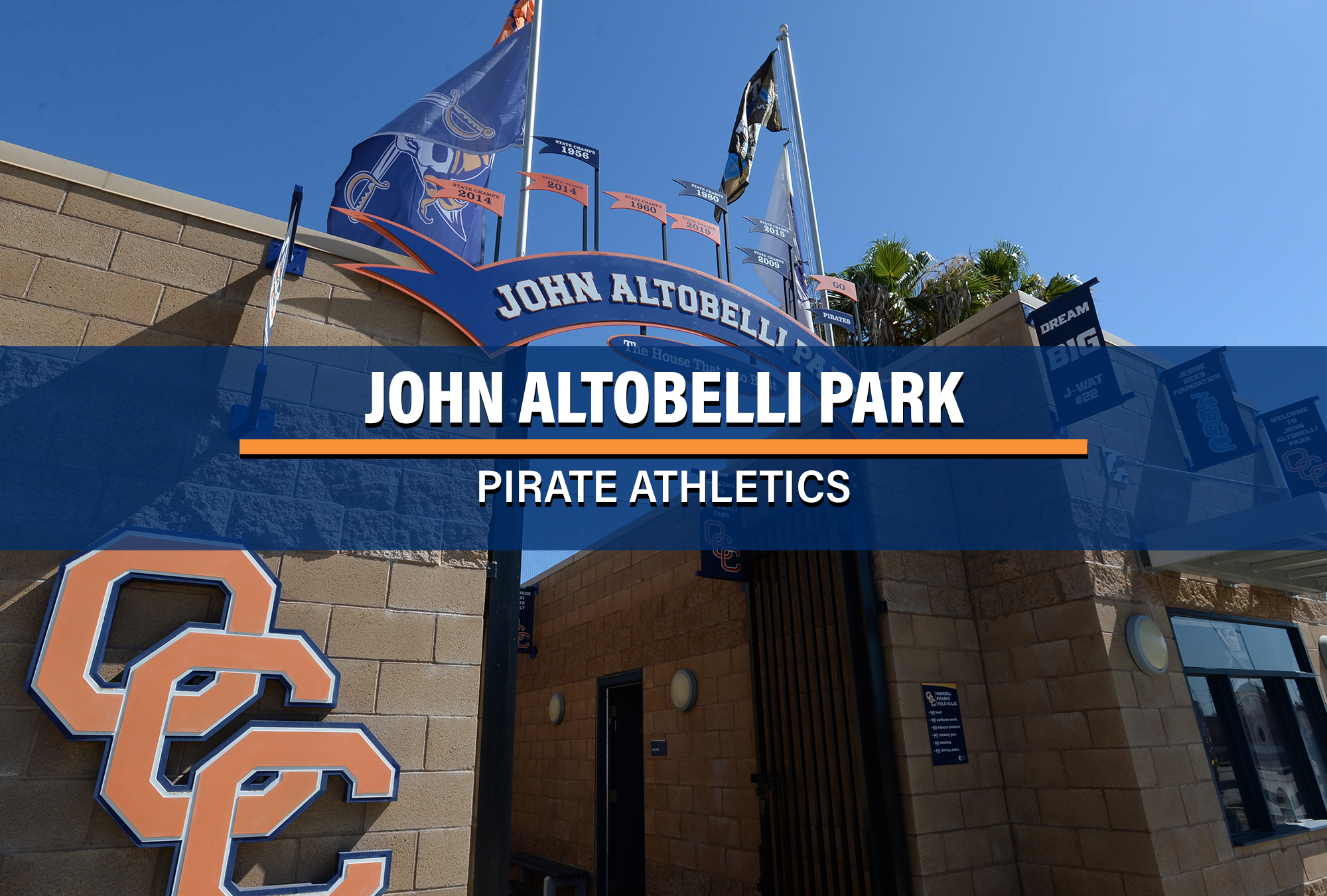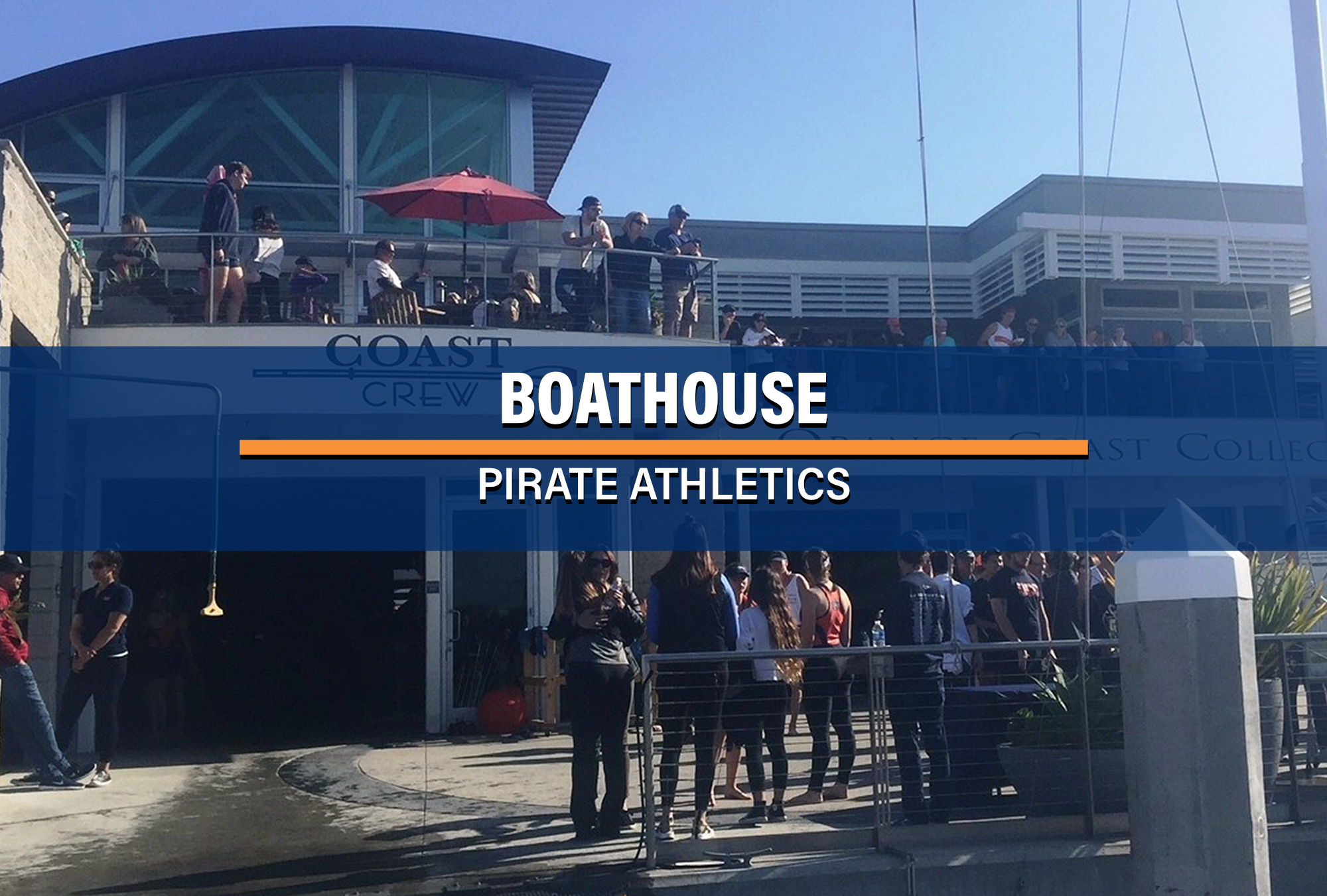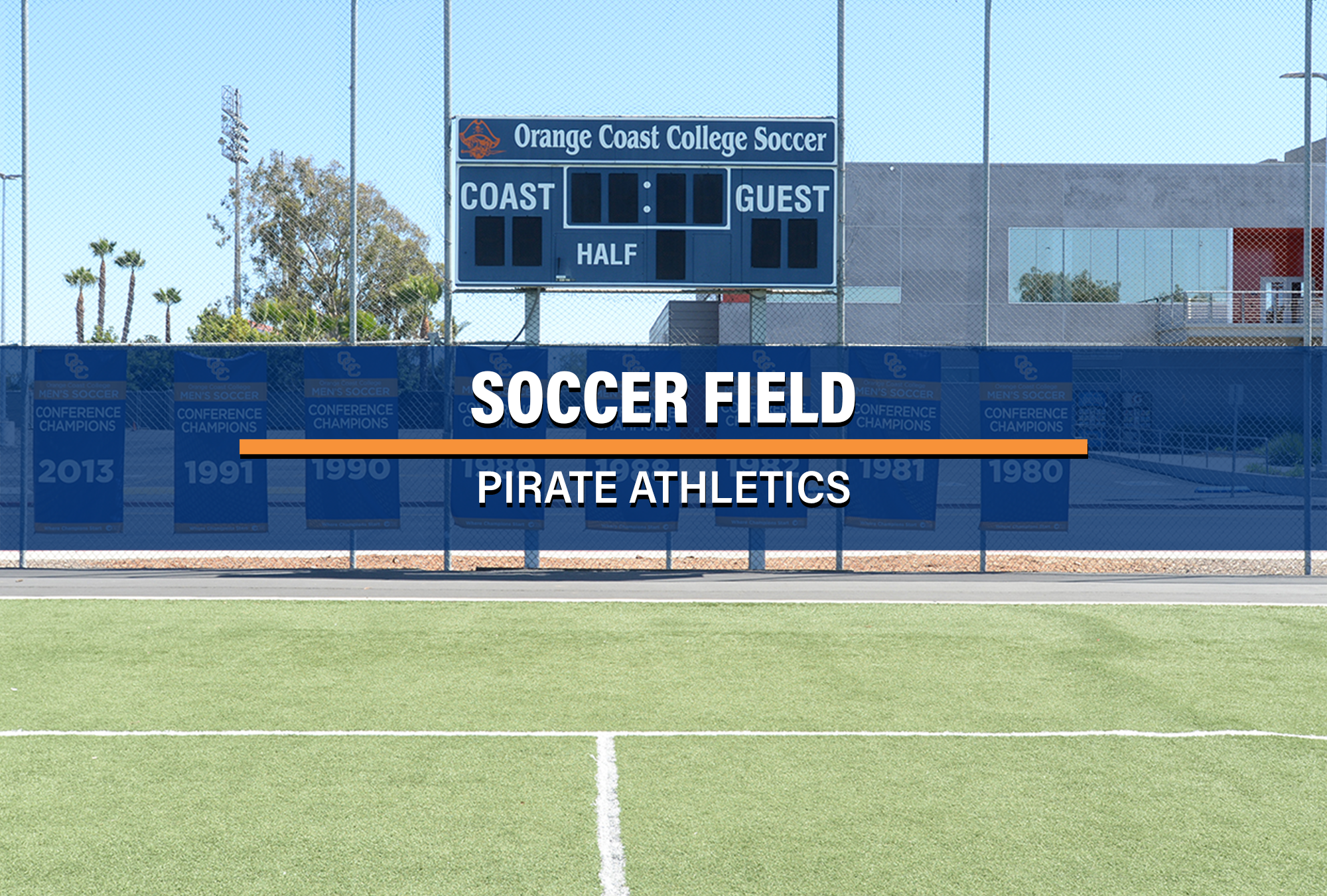
Former Pirate honors late coach at World Baseball Classic
COSTA MESA – The year 2005 might have just been one year in the life of Daniel Cooper, but for the former Orange Coast College pitcher, that one year was a life-changer, not only on the baseball field, but off the field as well.
 And now, 18 years later, Cooper said "thanks" the best way he could to his former Pirate baseball coach – the late John Altobelli – by wearing his beloved number "14" while representing Great Britain at this year's World Baseball Classic.
And now, 18 years later, Cooper said "thanks" the best way he could to his former Pirate baseball coach – the late John Altobelli – by wearing his beloved number "14" while representing Great Britain at this year's World Baseball Classic.
"It was just one of those decisions that sorta happened," Cooper said. "My number is usually some type of 9 and later in pro ball it was some type of 3 and in this case, I was wearing 33. One of my GBR teammates wanted that number and once I gave him my number, I wanted to show my respect to 'Alto', so what better place to do that than on national television to really show what he meant to me."
But there is a much bigger story to how Cooper found himself back into this global competition at the ripe ol' age of 36, facing the greats of the game, many years after the prime of his career had long since left his pitching arm.
The story begins at OCC …
After a standout prep career at Costa Mesa HS, Cooper had aspirations of playing at the Division I level, and his stellar play even caught the eyes of Major League Baseball scouts in the area. "Out of high school, I was actually drafted by the Montreal Expos," Cooper said. "That became a pretty fun joke among the announcers at the WBC … here's a player so old, he was actually drafted by the Montreal Expos!
"The schools I really wanted to play for weren't all that interested in me, so I went with a teammate over to Orange Coast to meet Alto and check things out. It was across the street and my mom taught at OCC, so I thought, 'why not?' It ended up being the best decision I ever made."
The stats on Cooper were impressive for a 2005 Pirate team that advanced all the way to the CCCAA State Final Four. The reliever and spot starter went 8-3 with two saves and a solid 3.25 ERA, allowing 23 runs in 63 2/3 innings with 57 strikeouts.
But Cooper is the first to tell you that his impressive win total for one season came largely from the magic of that 2005 squad.
 "I was referred to as 'The Vulture' because whenever I came into the game, we'd be either losing or tied and I'd throw 2-3 innings, we'd take the lead and I'd get the victory," Cooper said with a laugh. "I think I was second in the conference in wins that year and I think I started 2-3 games all season.
"I was referred to as 'The Vulture' because whenever I came into the game, we'd be either losing or tied and I'd throw 2-3 innings, we'd take the lead and I'd get the victory," Cooper said with a laugh. "I think I was second in the conference in wins that year and I think I started 2-3 games all season.
"But there was something about that team that was so wonderful to play for. We had some good players, but we didn't have any 'superstar' players, so we all just battled and believed in each other. Alto instilled his mantra of never giving up, to work hard and fight for your team and to always play for your teammates. Playing baseball that year at OCC was like playing with your family. In high school, we changed coaches a couple of times, and it wasn't quite that feeling, but at OCC, I learned how important it was to pull for the guy next to you. Even though I was only there for one year, Alto ALWAYS made me feel like a part of his family, all the way up until the day he died. I'd call him up to see if I could come back to the field and throw a bit and he'd always be like, 'Of course, Coop … come on out!'
Following his one year at OCC, Cooper moved on to play for Rice before transferring to USC to wrap up his collegiate career. At USC, Cooper was drafted by the Seattle Mariners, and he began his professional career.
But after reflection, Cooper remembers the shift of how baseball was run and operated after his OCC stint was through. "At OCC, we were just going out and playing the game," Cooper recalled. "We'd show up in uniform because we didn't have lockers back then and we just got ready to go on the field. It was just good ol' baseball. I think when I went to Rice, I wasn't prepared for how baseball was played at that level … more of a business-like approach. That took some time for me to adjust to and I don't think I got there when I was at Rice. It was a job … things were harder, and it took a toll on me, mentally. I finally re-found myself when I transferred to USC.
"You learn along the way just how important baseball is to you and how EVERY decision needs to have baseball in the back of your mind. 'Am I going to eat a cheeseburger for dinner tonight or am I going to have a salad because that's better for you and your baseball career?' It was a good life lesson and that really helped extend my baseball career."
But as his professional career went on for six seasons – peaking as high as AA baseball with the Jackson Generals in 2011 – Cooper noticed something happening to his pitching hand … specifically two of his fingers were causing him pain.
 "I first noticed it at USC," Cooper said. "I'd be pitching and it would feel like the tips of my fingers had needles poking in them. It would last for a couple of days, but then it would go away, so I just dealt with it.
"I first noticed it at USC," Cooper said. "I'd be pitching and it would feel like the tips of my fingers had needles poking in them. It would last for a couple of days, but then it would go away, so I just dealt with it.
After I was released by the Mariners and was playing independent ball in 2012, I really began to feel it in my index and ring fingers. But I threw primarily sliders, which used my middle finger more, so again, I just dealt with it. I noticed that when it was cold, I didn't have the same feel and control and it really began to hurt."
Cooper was suffering from Thoracic Outlet Syndrome, which is a disease that causes these painful feelings in his fingers and this condition caused Cooper to go down a rough path, both physically and mentally. "I remember I was playing for a team in Australia and I was dominating with an ERA under 1.00 and was getting calls about maybe coming back to the States to play more pro ball," Cooper said. "Then we had this huge cold front come through and from there on, I couldn't throw effectively. Whatever was locked into my brain mentally that helped me succeed left me and I wasn't good after that. If I can't pitch in the cold, I can't do this anymore. That's when I decided to hang'em up professionally."
But with the love of the game still deep in his heart, Cooper wanted to stay in the game, somehow. The next chapter of Cooper's career – The World Baseball Classic – is born. "When I trained at USC, there was a group I'd workout with and one guy was German and another one was Italian and we wondered what it would take to perhaps take a shot at the WBC," Cooper said. "One of us found a representative from the WBC and he got back to me and said, 'You played AA baseball … you're on the (Great Britain) team. Your mom is British, you're on the team … let's make it happen,'"
 And so began this odyssey for Cooper as he joined up with a baseball team in a country that didn't know a rosin bag from a tea bag. "It was tough going for the first several years, but we are now finally getting recognized by the British government as a sport," Cooper said. "We had no funding or connection whatsoever, but now we have a member of the British Olympic Committee who comes to every tournament and makes sure we are funded and hopefully, we can take Great Britain to the Olympics in 2028 when baseball comes back. But, for those first few years, we were paying our own ways and paying to just live and play the game."
And so began this odyssey for Cooper as he joined up with a baseball team in a country that didn't know a rosin bag from a tea bag. "It was tough going for the first several years, but we are now finally getting recognized by the British government as a sport," Cooper said. "We had no funding or connection whatsoever, but now we have a member of the British Olympic Committee who comes to every tournament and makes sure we are funded and hopefully, we can take Great Britain to the Olympics in 2028 when baseball comes back. But, for those first few years, we were paying our own ways and paying to just live and play the game."
After starting his GBR career with the 38th-ranked team in the WBC, Great Britain has gotten better and better, earning a spot in the 2023 Tournament. And on March 11 at Chase Field in Arizona, against Team USA, Cooper got to do what every "average Joe" dreams of doing … he got one more shot.
"Walking out onto a big-league field, with 40,000 people in the stands, I felt numb," Cooper said. "Before the game, I heard the National Anthem played for the first time at one of my games in 10 years. Hearing both of my anthems was an experience I'll never forget."
And as for the game? Well, Cooper came into the game in the bottom of the sixth with his team trailing 5-1, facing an array of batters that would make ANY top-level pitcher cringe, let alone a 36-year-old – guy whose fastball that once touched the 90s was well south of that.
After a single by Paul Goldschmidt and a double by Nolan Arenado put Team USA up 6-1, Cooper felt something strange come over him. "After I gave up the run, I just basically locked in and zoned out," Cooper said. "It was calmest I've felt on a mound my entire life … in a moment that should've been anything BUT calm. Like we talked about earlier … playing baseball at OCC didn't feel like a job and when I pitched at OCC, I know good things were going to happen, so, call it a higher power? Call it Alto being there with me? Everything just felt natural and easy to do out there at that moment."
 After getting out of the sixth, Cooper came back out for the seventh and faced another Murderer's Row of hitters, including a pair of local superstars in L.A. Dodger, Mookie Betts, and L.A. Angel, Mike Trout.
After getting out of the sixth, Cooper came back out for the seventh and faced another Murderer's Row of hitters, including a pair of local superstars in L.A. Dodger, Mookie Betts, and L.A. Angel, Mike Trout.
With a runner on second and one out, he coaxed Betts into a fly out, setting up a matchup with Trout, which, surprisingly enough, wasn't Cooper's first battle with the future Hall of Famer.
"We both got drafted in the same year, but under much different circumstances," Cooper said with a laugh. "I was this fifth-year college senior (selected in the 21st round) just looking for an opportunity and he was this can't-miss phenom out of high school (selected 25th overall). I faced him a few times in the Minor Leagues and I knew that he was going to be something special."
Against Trout in the WBC, Cooper just enjoyed the moment and maintained his calm with a little humor. "I'm going to give him my best 84 MPH sinker that I have and I'm going to either get him out, or he's going to hit it 10 rows deep into the bleachers," Cooper said. "I had him at a full count and battled another 5-6 pitches before I finally got him to fly out to end the inning. It was a really cool experience."
(For the record, Mike Trout is officially 0-for-6 with a walk in seven plate appearances against Cooper in the WBC, Minor Leagues and back-field matchups.)
In total, Cooper threw 2 2/3 innings in the WBC, allowed just one run and struck out two of the top players in the Major Leagues … not too shabby. But was this the last of Cooper's career as a player for Team Great Britain?
 "After we lost to Mexico and were eliminated, the cameras showed me on the rail of the dugout with my hand over my face and the announcers were saying, 'There's Daniel Cooper leaning on the rail, wondering if he'll ever pitch again' and to be honest, at that moment, I was thinking the exact same thing," Cooper said. "I'm still trying to decide if I do want to go do this again. It takes a lot of work, preparing for this and working a full-time job and I'm getting old … the body is starting to hurt more. But, (my pitches) still work – I got some of the best players in the world out -- so it's almost telling me I shouldn't stop. But I'm in a different place in my life then when I started. Coaching is in my future with this team, hopefully, I'm back in the WBC with Great Britain in some capacity, either as a player or as a coach."
"After we lost to Mexico and were eliminated, the cameras showed me on the rail of the dugout with my hand over my face and the announcers were saying, 'There's Daniel Cooper leaning on the rail, wondering if he'll ever pitch again' and to be honest, at that moment, I was thinking the exact same thing," Cooper said. "I'm still trying to decide if I do want to go do this again. It takes a lot of work, preparing for this and working a full-time job and I'm getting old … the body is starting to hurt more. But, (my pitches) still work – I got some of the best players in the world out -- so it's almost telling me I shouldn't stop. But I'm in a different place in my life then when I started. Coaching is in my future with this team, hopefully, I'm back in the WBC with Great Britain in some capacity, either as a player or as a coach."
Whether the WBC in 2027 becomes a reality, Cooper knows he has lived his childhood baseball dream to its fullest and has come to really appreciate what that one year at OCC meant to him moving forward in his life.
"Looking back at all of my career, there have been two teams that have really been the best moments of my baseball life ... one was playing for Great Britain … and the other one was playing for OCC."



































